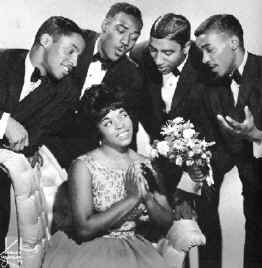

Ruby and the Romantics eptiomized the pop black sound of the early 60s
![]()
Originally starting out as the Supremes, an all male quartet in Akron, Ohio in 1961, the group consited of Ed Roberts (1st tenor), George Lee (2nd tenor), Ronald Mosely (baritone), and Leroy Fann (bass).
Meanwhile, Akronite Ruby Nash (born June 15, 1934), her sister, and two girlfriends had their own group playing talent shows.
One day Fann ran into West, and knowing how groups like the Platters and the Miracles had been successful with a female member, he asked her to join the Supremes
Music arranger Leroy Kirkland arranged for the Supremes to audition for Kapp Records A&R director Alan Stanton. Stanton agreed to sign them and picked Ruby to sing lead providing they changed the group's name. Not waiting, a few days later Stanton named them Ruby and the Romantics.
The Romantics' first single was "Our Day Will Come." The songwriters were sure about the song's hit ptental, but not about Ruby and the Romantics. As a concession, they made Kapp promise if the record flopped , Kapp would have Jack Jones record the song. There was no need to worry as on February 9, 1963 it entered the Billboard Hot 100. Six weeks later it was number one record nationally.
The groups next single " My Summer Love" reached #16 in the summer of 1963.
The follow-up "Hey There Lonely Boy" was a cleaner brand of pop that would later be known as MOR (Middle of the Road). "Hey There Lonely Boy" made it to #27 on Billboard's national charts.
Despite excellent recordings and songs the group subsequent records charted progressively lower. "Young Wings Can Fly" released in October 1963 only reached #47. "Our Everlasting Love" reached #64 in the spring of 1964.
Kapp tried a different approach with the mid-tempo pop R&B "Baby Come Home'" but the slide continued as it peaked at #75.
"When Your Young and in Love" (#48) and "Does He Really Care For Me (#87)," ended their chart career in February 1965.
In 1967 the group signed with ABC Records for two singles, one a reworking of the Platters' "Twilight Time." By this time the Romantics had been replaced by Vincent McLeod, Ronald Jackson, Robert Lewis, and Richard Pryor.
By 1968 the group had become an all girl trio consisting of Nash, Cheryl Thomas, and Denise Lewis.
Their last single was "Hurting Each Other."
The recordings of Ruby and the Romantics are considered prime examples of early 60s black pop. Their songs became hits in later years for other performers. The Marvelettes "Young and in Love" (323 Pop, #9 R&B 1967, "Hey There Lonely Boy" became "Hey There Lonely Girl" (#2 Pop, # 1969) for Eddie Holman. The Carpenters made "Hurting Each Other" #2 nationally in 1972 and Franki Valli rode "Our Day Will Come" #11 Pop in 1975.
Ruby and the Romantics called it quits in 1971 and West retired to raise a family. In the early 90s she was living in Akron and working for AT&T. Ed Roberts was living in New York and working for a bank. George Lee was driving a tuck. Leroy Fann died in 1973.